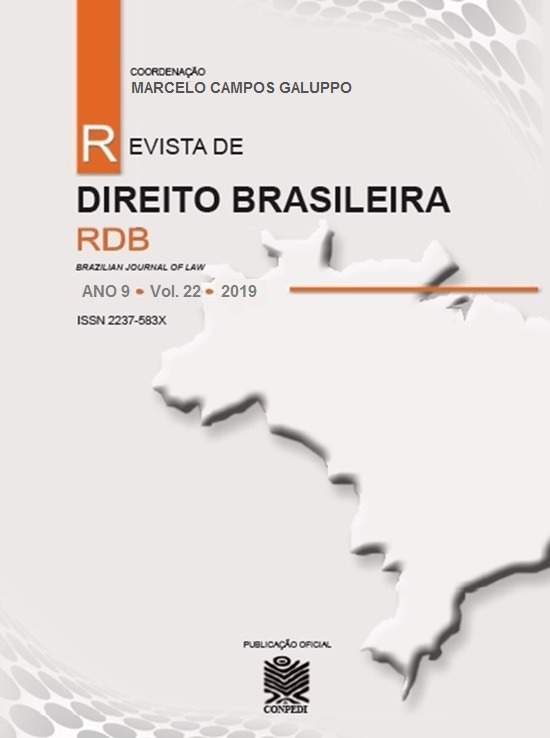ORIGINALISMO, INTERPRETAÇÃO CONSTITUCIONAL E SEUS SENTIDOS POLÍTICOS
Contenido principal del artículo
Resumen
Trata do originalismo, método hermenêutico norte-americano de cariz histórico. Objetiva escrutinar sentido original, atendo-se a sua força interpretativa semântica, valendo-se, para tanto, da verificação de sua inquirição histórica como escopo interpretativo-normativo. Propõe o debate político inserido no contexto interpretativo constitucional como mote do desenvolvimento dos métodos hermenêuticos, asseverando que o originalismo se alinha ao espectro conservador. Metodologicamente, vale-se do viés empirista e epistemológico de sua inquirição histórica, para o alcance do sentido original pretendido. Considera que o originalismo possui uma sólida premissa histórica em oposição a interpretações extratextuais. Conclui que o originalismo é uma fonte substancial de interpretação em apego a lei, consolidada pela leitura textual de suas linhas.
Descargas
Detalles del artículo
• O(s) autor(es) garante(m) que a contribuição é original e inédita e que não está em processo de avaliação em outra(s) revista(s);
• A revista não se responsabiliza pelas opiniões, ideias e conceitos emitidos nos textos, por serem de inteira responsabilidade de seu(s) autor(es);
• É reservado aos editores o direito de proceder ajustes textuais e de adequação do artigo às normas da publicação.
Autores mantêm os direitos autorais e concedem à revista o direito de primeira publicação, com o trabalho simultaneamente licenciado sob a Licença Creative Commons Attribution que permite o compartilhamento do trabalho com reconhecimento da autoria e publicação inicial nesta revista.
Autores têm autorização para assumir contratos adicionais separadamente, para distribuição não exclusiva da versão do trabalho publicada nesta revista (ex.: publicar em repositório institucional ou como capítulo de livro), com reconhecimento de autoria e publicação inicial nesta revista.
Autores têm permissão e são estimulados a publicar e distribuir seu trabalho online (ex.: em repositórios institucionais ou na sua página pessoal) a qualquer ponto antes ou durante o processo editorial, já que isso pode gerar alterações produtivas, bem como aumentar o impacto e a citação do trabalho publicado (Veja O Efeito do Acesso Livre) emhttp://opcit.eprints.org/oacitation-biblio.html
Citas
BALKIN, Jack M. Living Originalism. Cambridge: Harvard University Press, 2014.
BARNETT, Randy E. The Gravitational Force of Originalism. Georgetown Law Faculty Publications. v. 82, n. 2, 2013. p. 412-431.
BELTRÁN DE FELIPE, Miguel. Originalismo e Interpretación. Madrid: Civitas, 1989.
BENNETT, Robert W.; SOLUM, Lawrence. Constitutional Originalism: A Debate. Ithaca: Cornell University Press, 2016.
BORK, Robert H. A Time do Speak: Selected Writings and Documents. Wilmington: Isis Books, 2009.
______. Neutral Principles and Some First Amendment Problems. Indiana Law Journal. v. 47, v.1, 1971. p. 1-36.
BREST, Paul. The Fundamental Rights Controversy: The Essential Contradictions of Normative Constitutional Scholarship. Yale Law Journal. v. 90, n. 5, 1981. p. 1063-1109.
DELAHUNTY, Robert J. Response, Originalism and Legitimacy: A Reply to Professor Powell, University of St. Thomas Law Journal. v. 7, n. 2, 2010. p. 281-287.
DWORKIN, Ronald. Law's Empire. Cambridge: Harvard University Press, 1986.
ELY, John Hart. Democracy and Distrust: A Theory of Judicial Review, Harvard University Press, 1980.
ESKRIDGE, William N. Jr. The New Textualism and Normative Canons. Columbia Law Review. v.113, n. 1, 2013. p. 531-591.
GADAMER, Hans-Georg. Verdade e Método. 2. ed. Tradução de Flávio Paulo Murer. Petrópolis, Vozes, 1987.
GOLDFORD, Dennis J. The American Constitution and the Debate Over Originalism. Cambridge: Cambridge University Press, 2005.
HERNANDEZ GIL, Antonio. Metodologia del Derecho. Madrid: Revista de Derecho Privado, 1945.
KIRK, Russell. The Conservative Mind: From Burke to Eliot. 7. ed. Washington, D.C.: Regnery Pub, 2001.
LAWSON, Gary. No History, No Certainty, No Legitimacy... No Problem: Originalism and the Limits of Legal Theory, Florida Law Review, v. 64, 2012. p. 1551-1571
LIPKIN, Robert Justin. Constitutional Revolutions: Pragmatism and the Revolutionary Role of Judicial Review in American Constitutionalism. Durham: Duke University Press, 2000.
______. Indeterminacy, Justification and Truth in Constitutional Theory, Fordham Law Review. v. 60, n. 4, 1992. p. 595-643.
MACIEL, Débora Alves; KOERNER, Andrei. Sentidos da Judicialização da Política: duas análises. Lua Nova, n. 57, 2002.
MALTZ, Earl M. Rethinking Constitutional Law: Originalism, Interventionism, and the Politics of Judicial Review. University Press of Kansas, 1994.
O'NEILL, Johnathan G. Originalism in American Law and Politics: A Constitutional History. Johns Hopkins University Press, 2007.
PERRY, Michael J. The Constitution in the Courts: Law or Politics? Oxford: Oxford University Press, 1996.
______. We the People: The Fourteenth Amendment and the Supreme Court. Oxford: Oxford University Press, 2002.
PETERS, Christopher J. Legal Formalism, Procedural Principles and Judicial Constraint in American Adjudication. PINESCHI, Laura (Org.). General Principles of Law: The Role of the Judiciary. New York: Springer, 2015. p. 23-45.
PRIMUS, Richard A. When Should Original Meanings Matter? Michigan Law Review. V. 107, n. 2, 2008. p. 165-222.
SCALIA, Antonin. A Matter of Interpretation: Federal Courts and the Law. Princeton: Princeton University Press, 2016.
______. Originalism: The Lesser Evil. University of Cincinnati Law Review. v. 57, n. 1, 1989. p. 849-64
______. ; GARNER, Bryan A. Reading Law: The Interpretation of Legal Texts. St. Paul, MN: Thomson, 2012.
SCRUTON, Roger. Como ser um Conservador. Tradução de Bruno Garschagen e Márcia Xavier de Brito. Rio de Janeiro: Record, 2015.
STRANG, Lee J. Originalism as Popular Constitutionalism: Theoretical Possibilities and Practical Differences. Notre Dame Law Review. v. 87, n.1, 2013, p. .
STRAUSS, David A. Originalism, Conservatism, and Judicial Restraint. Harvard Journal of Law and Public Policy. v. 34, n.1, 2011. p. 137-146.
______. The Living Constitution. New York: Oxford, 2010.
VERBICARO, Loiane Prado. Um Estudo sobre as Condições Facilitadoras da Judicialização da Política no Brasil. Revista Direito GV, n. 4, 2008.
WHITTINGTON, Keith E. Interpose Your Friendly Hand: Political Supports for the Exercise of Judicial Review by the United States Supreme Court. American Political Science Review, v. 99, n. 4, 2005. p. 583-596.
______. Is Originalism Too Conservative? Harvard Journal of Law & Public Policy. v. 34, n .1, 2011. p. 38-41.
______. On Pluralism Within Originalism. In: HUSCROFT, Grant; MILLER, Bradley W. (Orgs.). Challenge of Originalism: Theories of Constitutional Interpretation. Cambridge: Cambridge University Pres, 2013. p. 70-86.





